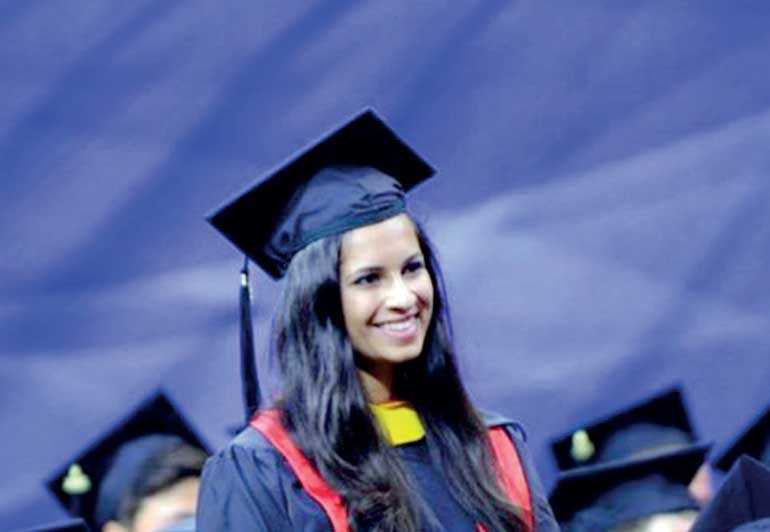Saturday Feb 14, 2026
Saturday Feb 14, 2026
Tuesday, 24 September 2019 00:44 - - {{hitsCtrl.values.hits}}

The MBA might be the last formal qualification an executive will pursue
Many of us who are into imparting knowledge were thrilled to hear the Chairman of the University Grants Commission Prof. Mohan de Silva stressing on the importance of a national quality assurance system for both State and non-State education.
He went on to say that quality assurance was not aimed at discouraging private higher education institutions but to make them more transparent and build public confidence that the degrees they provide are in line with international standards. This exactly what many of us has been advocating in Sri Lanka on the franchised MBA programs so that the quality of talent in Sri Lanka will help organisations to be more competitive.
MBAs in SL – 32
Believe it or not there are 32 MBAs that one can pursue in Sri Lanka. They are essentially from the UK but if you want it from another country like Australia, US, India or Canada, all can be pursued in Sri Lanka. The prices ranges from 0.3 to 1.2 million and duration from a 12-month programme to 18 months.
Whenever a youngster asks me for advice, my key thought is to carefully select an MBA program that you will follow as the end objective is not a certificate but the ‘behaviour change’ that happens during the program that makes you sharper and smarter post the MBA. On a separate point, this might be the last qualification that a young executive of today will pursue, so select the program carefully. More importantly, one will spend almost two years of one’s life so get the best ROI. 
Last week the UGC Chairman Professor De Silva addressing on the theme ‘Professional education – imperative for economic growth today,’ very rightly stated that “in the modern world more than half of the countries have their own quality assurance systems but so far Sri Lanka has failed to have a quality assurance commission for higher education.”
This is absolutely true given the ‘shell MBA programs’ that are in offer in Sri Lanka. Meaning, the brand is offered to the Sri Lankan entity to run but the product (content, etc.) is not provided by the university.
Until the Government gets its act together to govern such entities, let me share how to one can do a QA system before selecting an MBA course of study:
1) Check the content
There are many MBAs in the market where the content taught is outdated. In fact, the content is sometimes downloaded by lecturers and taught and it cannot be hosted on the ‘blackboard’ of the said university due to copyright violations.
Hence, make inquiries from the batches before which have studied on the MBA program on the content shared by the lecturers and what the feedback was. This is a very important criteria rather than the glossy magazines and sexy advertising done on print and digital media. This is your last qualification so learn the most modern ‘best practices’ rather than just getting a qualification.
2) Check against the original programs
This is a very important point to check. It’s very important to find out the MBA program run by the university in the host country. What this means is that if it’s a UK university, then check the subject offered and the syllabi in the UK as against the one run in Sri Lanka. Sometimes you will find that the subjects taught are not even trendy in today’s world as they are ‘old editions’ exported by the overseas university to be run in Sri Lanka.
I have many times intimated to the Government when I was heading ‘National Economic Planning’ in the Finance Ministry that we must have a national regulator to govern private sector postgraduate studies. It is great that an initiative is in the making of which I am also in the core team. Until this comes into play we must ensure that students do not get cheated. Many local education entities are using MBA programs as a cash cows to their entities and thereby the local franchise owner earns a quick profit. Be extra cautious on this point.
3) The lecture panel
It’s important to check the lecture panel and how long they have served on the MBA program. The logic being that professions from the business world do not want to get ‘tarred’ by improper MBAs and content that is not in sync to the real world. Recently, in one MBA program the total faculty bowed out as the said MBA program was virtually a ‘shell,’ meaning it’s like giving a car that does not have an engine.
If you hear that there is a regular turnaround of lecturers in a local partner, it is an indicator that there is something not right that needs further research. Take your time and do your homework. Sri Lanka is a unique market where top business professionals invest time on education and they do this with a lot of passion. Check with your colleagues before sacrificing two years of your life on an MBA education.
4) The lead
Locate the lead of the MBA program in Sri Lanka for the given advertised MBA before your final decision. Try to meet the lead on the MBA program and get his understanding on the subjects offered, content and lecturers. Sometimes it’s useful to find out prototype assignment questions asked as we have noticed that in some MBA programs the assessments are structured to a British situation that is not relevant to Sri Lanka.
As an example in the financial management paper asking for a critical analysis on a ‘business plan’ is not practical in Sri Lanka. No company will give business plans to students to do MBA studies as it’s a highly-confidential document.
Think about these practical aspects before paying the enrolment fee given that you are balancing many things in your day-to-day life as a busy executive. You don’t want to be in situation where you have to question the structure of the MBA program you are following after enrolling.
5) The dissertation
This is where the crunch time on the program happens. Good MBAs have a detail structured process stipulated by the university on dissertations.
There is a clear guideline issued on the specific nuances of the MBA program you are following and standards expected from the final dissertation.
There was one situation last month where the module leader quit the university in UK when the program in Sri Lanka was just entering the dissertation time period.
So find out who the module leader is at the main university and check the credentials before embarking on the program. Please remember that the best learning you get is from the dissertation.
Do it right. This is where your brain gets trained on academic rigour. Make sure the dissertation process is smooth in the MBA program that you get enrolled in.
6) Free offers
Be careful of offers like ‘50,000 waived off for the first 20 students’. Good MBAs don’t give incentives to join. The quality of the program drives the demand. If there are brand endorsees make sure that they are credible in the promises they are making to you. My advice to you is set aside a particular budget for MBA studies. Do not look for offers. This is the investment you are making for your future at midcareer. Select the best and focus.
Get the best out of the program rather than just the certificate. Rather than focussing on discounts try to get an insight into who else is on the program. Remember that the major part of your learning comes from your batch mates.
7) Outside the MBA class
We see that when one enters an MBA program there is so much of enthusiasm. One of the key learnings for life from an MBA program is to balance exam/assignment deadlines, family responsibilities, attending compulsory company events and squeezing in gym workouts, etc. But the reality is that your competitiveness will depend on how you balance the different roles mentioned above and study. This requires a change of behaviour to the new demand that an ‘executive of today’ goes through.
The logic being that to survive in today’s world we must hunt for best practices and identify quickly the disruption happening in the marketplace.
In other words ‘the learning outside the MBA classroom’. Hence, watching NDTV, Hiru/Derana TV, CNN Board Room, reading HBR/Daily FT and the Nielsen quarterly update must become a way of life. If this change of behaviour does not happen when studying for an MBA, you have missed one of the key lessons of reading for an MBA.
8) Best in the basics
Remember that modern day MBA programs have some interesting subjects like ‘ Business Simulation’ that are very interesting to teach for a lecturer and for a student it’s brilliant to learn. The new fad is Artificial Intelligence but many fail to remember that best practices business are: segmentation, targeting and positioning. My teacher late Professor Uditha Liyanage’s mantra of business was STP: the basics of business.
I keep advocating to my tourism friends that post the Easter attacks, we see demand crashing with rates slashed by almost half. The only way to recover is by ruthlessly practicing Segmentation, Targeting and Positioning – the basics of business.
Maldives Tourism, Seychelles, Mauritius, Tourism Malaysia, Thailand and Singapore are all successful by the use of basics, not complex theories that we learn with MBA programs.
9) MBA – ranking
Whilst it is good to check the rankings of the universities when selecting an MBA, my view is that it’s better to check if there is a link between the subjects offered in Sri Lanka with the university overseas.
For instance we have situations where a MBA program run in Sri Lanka has a subject called ‘International Management’ but the university did not give the content.
The lecturer even after googling the subject realised there is no such subject that can be located on the net today.
Finally, on the day of commencement of classes a similar subject called ‘Global marketing’ is been downloaded and taught. The given lecturer even after informing the university and the local entity has had no response. Hence we see that ranking does not give a reality picture of the quality of the MBA. Take your time and do the research.
Next step
Whilst a student can zero down on the above to evaluate MBA programs in Sri Lanka, it is great that the likes of the UGC Chairman have realised that substandard education institutes must be monitored and governed.
I would strongly advocate this process start from ‘MBA programs’ as they churn out the top management talent to the private sector that drive organisations. Let’s accept it, 70% of GDP of the country is generated by the private sector, so we must not compromise quality at this level.
(The writer is an alumnus of Harvard University and was recently awarded the ‘Abdul Kalam’ Pride of the Nation Award 2019. He heads a global AI company for the South Asian region.)